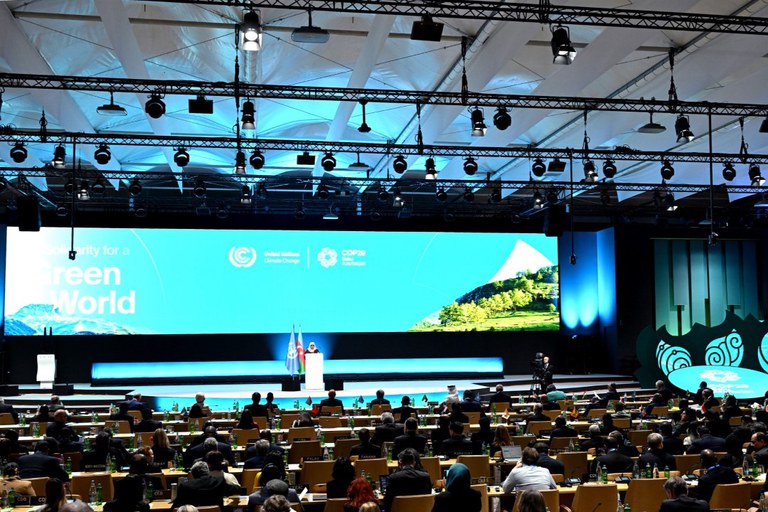Advanced cookie settings
To improve your experience on the platform and provide personalized services, we use cookies.
Notícias
ENVIRONMENT

The Summit is the leading international forum for climate negotiation, bringing together around 70,000 delegates with activities running until November 22 - Credit: COP29
On the first day of COP29 in Baku, Azerbaijan, country representatives reached a consensus on some of the general rules that should guide the global carbon market and the creation of carbon credits under the Paris Agreement (Article 6). The Summit is the leading international forum for climate negotiations and brings together around 70,000 delegates, with activities running until November 22.
This will be a transformative tool for directing resources to the developing world. After years of stalemate, progress began in Baku. But much remains to be done.” – Muxtar Babayev, President of COP29
The decision allows the market mechanism managed by the United Nations to start detailing the types of projects and activities that can generate carbon credits. According to the COP29 Presidency, using the tool should reduce the cost of implementing national climate plans by 250 billion dollars a year, stimulating cooperation between countries. This will encourage greater climate action through increased demand for carbon credits and ensure the international market operates with integrity under UN supervision.
“This will be a transformative tool for directing resources to the developing world. After years of stalemate, progress began in Baku. But much remains to be done,” said COP29 President Muxtar Babayev. “By linking buyers and sellers efficiently, these markets could reduce the cost of implementing Nationally Determined Contributions (NDCs) by US$ 250 billion annually. In a world where every dollar counts, this is essential,” he said.
In practice, the decision recognizes the technical work carried out by the mechanism's supervisory body under Article 6.4 of the Paris Agreement, which makes it possible to generate carbon credits from forest restoration and renewable energy projects, among others. The supervisory body's guide includes the rules for preventing emissions leakage and ensuring compliance with social safeguards. In the specific case of activities in the forestry sector, such as reducing deforestation and increasing stocks through forest restoration, it was decided that carbon projects must be aligned with the national strategy for reducing emissions from deforestation and degradation and increasing forest carbon stocks (REDD+). The aim is to allow countries to invest in CO2 reduction abroad in exchange for emission credits/rights with environmental integrity.
The idea is, for example, for a developed country to fund greenhouse gas emission reduction projects in a developing country and, in return, receive a license to emit carbon within a specific limit beyond its target. The full operationalization of Article 6 is fundamental in this year's negotiations and an essential step towards establishing continued progress in the next two weeks of talks.
REGULATIONS — This Tuesday, November 12, the Brazilian Senate analyzes the bill of law that proposes regulating the carbon credit market (PL 182/2024). According to the text, companies will be able to offset the emission of polluting gases by purchasing credits linked to environmental preservation initiatives.
The bill of law divides the Brazilian carbon credit market into two sectors: regulated and voluntary. The first promotes decarbonization through government targets for different sectors of the economy, which can be met by reducing emissions within companies or purchasing carbon credits generated by methodologies accredited by the managing body of the Brazilian emissions trading system. The proposal also clarifies rules for the voluntary market, where companies seek to acquire carbon credits to meet corporate targets for neutralizing greenhouse gas emissions. In this regard, PL 182/2024 clarifies the rules for REDD+ projects and programs that generate carbon credits and donations based on reducing emissions from deforestation and degradation and increasing carbon stocks in native vegetation. The proposal under discussion by the Senate establishes rules for the development of state and jurisdictional REDD+ programs, guaranteeing the primacy of the right of legitimate owners and usufructuaries, including indigenous peoples and traditional peoples and communities, to carry out carbon projects in their areas. In this way, Brazil will nationally reflect the rules recently adopted by the United Nations Framework Convention on Climate Change (UNFCCC).
CO2 equivalent is a measure used to compare the emissions of different greenhouse gases, taking into account the global warming potential of each substance and representing the total amount of CO2 that would have the same potential. Organizations subject to regulation must provide a monitoring plan and reports on their activities to the management body.
